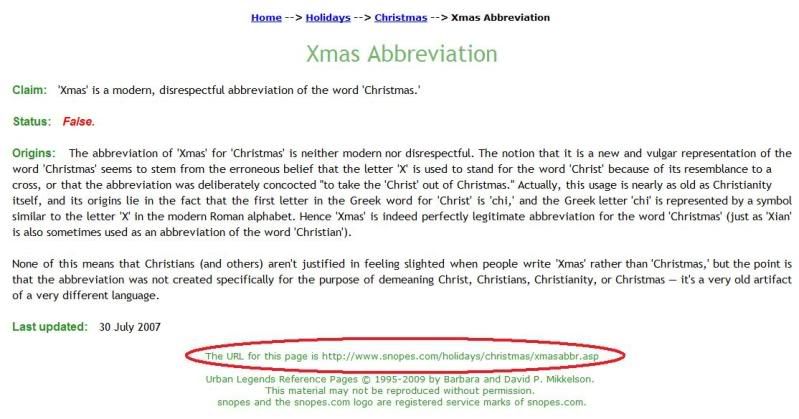 This time of year there is always great debate (among those who just need a reason to debate) about the meaning of Christmas. Whether you celebrate it as the birth of Christ, or just a time to give gifts, or some other manufactured holiday [see Kwanzaa], Christmas should be a time of great joy and happiness, shared with family and friends, blah, blah, blah. Right?
This time of year there is always great debate (among those who just need a reason to debate) about the meaning of Christmas. Whether you celebrate it as the birth of Christ, or just a time to give gifts, or some other manufactured holiday [see Kwanzaa], Christmas should be a time of great joy and happiness, shared with family and friends, blah, blah, blah. Right?I say, emphatically, NO!
Christmas is a time of year that we recognize the birth of our Savior. Period. You may give gifts, which is great, as on that first Christmas day we received the greatest gift of all from our Creator God in the birth of His Son, Jesus Christ, sent to take away the sins of the world. But as I mentioned earlier, much of the debate of this time of year centers around the terms "Christmas Tree," or the use of the letter 'X' instead of 'Christ' in the word Christmas. It is that which weighs heavily on my mind today.
Christmas. Xmas. Or X-mas. What is the difference. Is there really any difference? Many people -- including some of my own loved ones -- intentionally use the letter 'X' to replace 'Christ' in Christmas, as if by writing the word differently they can remove the real reason for the season.
But what does the 'X' really represent? Consider this, from Wikipedia:
"The word Christmas originated as a compound meaning 'Christ's Mass'. It is derived from the Middle English Christemasse and Old English Cristes maesse, a phrase first recorded in 1038.[6] 'Cristes' is from Greek Christos and 'maesse' is from Latin missa (the holy mass). In Greek, the letter Χ (chi), is the first letter of Christ, and it, or the similar Roman letter X, has been used as an abbreviation for Christ since the mid-16th century.[12] Hence, Xmas is often used as an abbreviation for Christmas."But maybe you're one who views Wikipedia as flawed, due to it's social editing structure. In that case, consider this:
From Bill Purdue, an Open University historian:
"I suppose to us it will always look like an abbreviation, but it would first seem to be an abbreviation used by clerics with a good knowledge of ancient languages."Or this, from About.com:
It is said that when the Emperor Constantine had his great vision that caused him to convert to Christianity, he saw the Greek letters Chi and Rho intertwined. Chi is written as an 'X' and Rho is written as a 'P', but they are the first two letters of the Greek word Christ 'savior'. 'XP' is sometimes used to stand for Christ. Sometimes X is used alone. This is the case in the Chi (X) abbreviation for Christ in Xmas. Thus, Xmas is not directly a way of secularizing the holiday, but since 'X' is not Chi in English, we read the word as X-mas and see no connection with Christ.Still not convinced? Then maybe you should consider this, from Snopes.com, one of the most reputable sites for debunking urban myths (presented as a screen capture as well as text -- click image to enlarge):

The abbreviation of 'Xmas' for 'Christmas' is neither modern nor disrespectful. The notion that it is a new and vulgar representation of the word 'Christmas' seems to stem from the erroneous belief that the letter 'X' is used to stand for the word 'Christ' because of its resemblance to a cross, or that the abbreviation was deliberately concocted "to take the 'Christ" out of Christmas."So there you have it. No matter how you slice it -- or spell it -- Christmas is just that, the celebration of the birth of our Lord and Savior Jesus Christ. Merely substituting 'Christ' with an 'X' does not change that. Am I suggesting that you shouldn't celebrate Christmas if you haven't accepted Christ as your Lord and Savior?
Actually, this usage is nearly as old as Christianity itself, and its origins lie in the fact that the first letter in the Greek word for 'Christ' is 'chi,' and the Greek letter 'chi' is represented by a symbol similar to the letter 'X' in the modern Roman alphabet. Hence, 'Xmas' is indeed perfectly legitimate abbreviation for the word 'Christmas'...
Quite the contrary. Instead, I suggest you continue to celebrate Christmas with your friends and family, giving gifts and singing carols, and all that has come to be a traditional Christmas celebration. Oh, yeah, and I strongly encourage you to come to a personal relationship with Christ, because without that, everything we do on this Earth is for nothing.
Send me your comments. Joe








3 comments:
I like your Xmas article.
But I have found that the true origin of a symbol, or a word, is not what is important. Perhaps it should be important, but it isn’t. What matters is how the object is viewed in present time, by the majority of people. The emotions evoked by a specific word or symbol is what is important. For example, the Confederate Stars and Bars flag is not a symbol of racism. In fact, the Civil War was not really fought to free the slaves. But the majority of people today believe that this war WAS fought to free the slaves, and the majority of people see the Confederate flag as a symbol of racial hatred. Because of this, the Confederate flag evokes the feelings of racism and hatred. So the Confederate flag IS a symbol of hatred. And people do not want to be educated about the truth.
So, while I agree with you about the Xmas issue, I am afraid that the “X”, in the minds of the masses, will remain an attempt to remove Christ from Christmas.
For many years now, I have been abbreviating it by writing “CMas” rather than “Xmas”. And strangely enough, I have been complimented for doing that – because the “C” clearly stands for Christ. Humorous. I just smile at the comments…
Ignorance is killing the country.
Thanks for your comments.
Just as the Confederate flag can only wave freely when we discard the notion of "affirmative action" and truly embrace equality, only when we as a community of Christ-followers accept the term "Merry Xmas" for what it really is can we defeat those who intentionally use the 'X' to eliminate Christ from Christmas.
I, as an individual, have never owned a slave or discriminated against a race in such a way as the slaves experienced discrimination. And no one I know has ever been a slave or experienced that type of discrimination. It's time for us to label slavery as a fact of history and to rise above it as a nation of equal peoples.
Similarly, it is time for we Christ-followers to rise above the attempts of others to eliminate Christ from the world and show to them, as I have attempted to do here, that their attempts are misdirected and malformed.
If you sent me a Birthday card that said, "Happy B-day," would I infer that you were trying to remove me from my own birthday? Or that you were trying to remove the fact that I was born from the history of that day? That would be absurd.
Merry Xmas to all!
I understand what you were saying. And I am not disagreeing with you. (At least on the original post – not sure we are on the same page as it relates to affirmative action and the confederate flag.)
The point I was trying to make is that symbols are very important. Symbolism, in the hands of one who knows how to use it, is the most powerful of tools (or weapons). Symbolism is what brings tears to my eyes when hearing the national anthem. It is why we pledge loyalty to a flag.
And it does not matter why a particular symbol was first created. It does not matter what a particular symbol means in an intellectual sense. What matters is what the masses believe that it stands for. What the people believe that it means. Because that symbol will evoke that particular feeling in the masses.
So, if the masses believe that “Xmas” is a secular way to express “Christmas”, then that is exactly what “Xmas” means. I have not seen any studies on this, but it does seem that many people (perhaps a majority) believe that using the letter “X” is an attempt to remove Christ from Christmas.
“Gay” used to mean “happy”. But today the term “gay” refers to a homosexual. And even if you use the word “gay” in a sentence that pretty clearly shows that you are using it for is old meaning of “happy”, the reader will subconsciously flash on the thought of homosexual. So “gay” means “homosexual”, because that it how the masses view it.
And I suspect that even if you educate the reader every time you use the word “Xmas”, if that person already sees the “X” as a slight to Christ, then that reader is distracted from the message you were actually trying to send.
Perhaps, if we all started using the term “Xmas” rather than “Christmas”, over time we could reclaim the feelings evoked by the word, and a person’s emotions would flash on Christ, rather than secularism. But it is a gamble. If it fails, we may have unintentionally pushed the celebration to a more secular position.
Remember, the author is not important. The reader is important. What the reader interprets is what matters.
Happy Holidays. ;-)
Post a Comment